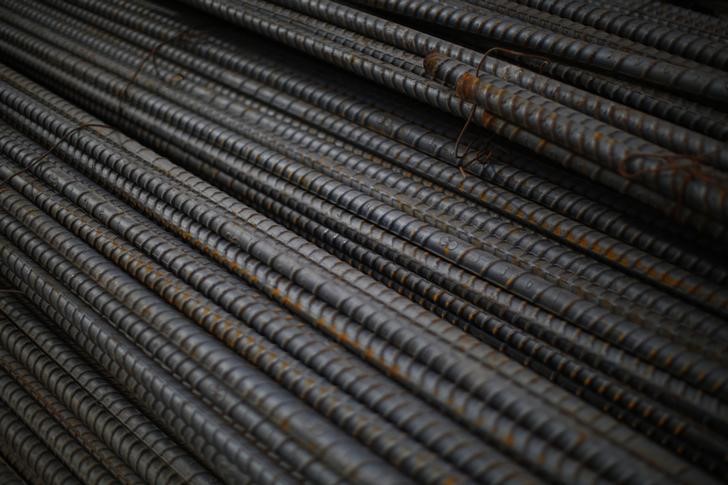By Ginger Gibson
WASHINGTON (Reuters) - American manufacturers, energy companies and retailers reliant on cheap steel are quietly lobbying against President Donald Trump's desire to impose tariffs on steel imports ahead of possible decision by the U.S. Commerce Department next week.
Honoring a promise made in the 2016 election campaign, in April this year Trump initiated a “Section 232” review of the steel industry, a provision in the Trade Expansion Act of 1962 allowing for the imposition of tariffs or quotas on imports if they threaten national security. The provision has only been used to review imports twice before.
The Commerce Department could issue findings on the matter as early as next week, a decision that three lobbyists say has been delayed due to debate inside the administration.
Steel producers in the U.S., like U.S. Steel Corp and AK Steel stand to benefit from protectionist tariffs which would enable them to raise their prices.
But U.S. manufacturers and energy companies who use steel want to keep their costs down and say tariffs could costs jobs in their industries, while retailers need cheap steel for many facets of their business including shelving in their stores and warehouses, and to sell to consumers.
Any U.S. tariffs may also result in damage to unrelated industries if other countries retaliate by also imposing tariffs on American exports in sectors such as agriculture.
“Our member companies have quietly had these conversations with both members of the administration but also with the Hill,” said Hun Quach, the vice president for international trade at the Retail Industry Leaders Association.
Those in favor of approving new tariffs include not only steel manufacturers, but some aligned unions. They have allies in Commerce Secretary Wilbur Ross and U.S. Trade Representative Robert Lighthizer, a former U.S. Steel lawyer who has promised to recuse himself from decisions regarding the industry.
PROS AND CONS
Mario Longhi, who until a few weeks ago was chief executive of U.S. Steel, said earlier this year that curbing cheap steel imports could restore jobs for 10,000 American steel workers.
The U.S. steel industry employed about 147,000 people in 2015, according to the Commerce Department's Bureau of Economic analysis.
But manufacturers that need steel employ about 6.5 million people each year, and the construction industry supports another 6.3 million jobs.
Manufacturers argue that pushing up the cost of steel by imposing tariffs on imports ultimately hurts American consumers who will pay more for everyday goods made from steel, such as lawn mowers, washing machines, and microwaves.
When former President George W. Bush imposed steel tariffs in 2002, the move was found illegal by the World Trade Organization which permitted other countries to retaliate against American exports and Bush was forced to back down.
Studies by the free trade lobby group, the Consuming Industries Trade Action Coalition (CITAC), found that 200,000 workers in U.S. manufacturing lost their jobs as a result of the 2002 steel tariffs.
POLITICAL RISK
Pushing back against something that was a signature piece of Trump’s campaign carries some political risk though and most companies would only elaborate on their lobbying efforts anonymously, saying they were making their case to Trump and lawmakers behind closed doors.
They see allies in Gary Cohn, the head of the National Economic Council and Agriculture Secretary Sonny Perdue.
“We’ve been quite vocal both on the Hill and in the administration,” said a lobbyist for a large manufacturing company that uses both U.S. steel and imported steel, but who declined to speak on the record over concerns public statements could damage relationships with the White House.
Several companies have also been pressing members of Congress to advocate against tariffs with the administration on their behalf, said several lobbyists.
Several companies, including National Oilwell Varco Inc (NYSE:NOV)., Ball Corporation (NYSE:BLL), and Electrolux, submitted public comments to the Commerce Department arguing against tariffs.
The American Petroleum Industry, which represents the largest oil refiners and chemical companies including ExxonMobil (NYSE:XOM), Shell (LON:RDSa) Oil Company, Chevron (NYSE:CVX) and Dow Chemical Company (NYSE:DOW), issued forceful comments against the proposed tariffs, as did the American Automotive Policy Council, which includes Ford Motor (NYSE:F) Co. and General Motors (NYSE:GM).

“The auto industry and the U.S. workers that the industry employs would be adversely affected and that this unintended negative impact would exceed the benefit provided to the steel industry,” the American Automotive Policy Council said in a message echoed in other comments.